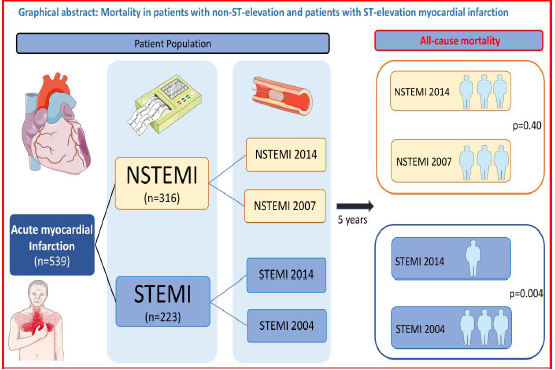Mortality in patients with acute coronary syndrome – a prospective 5-year follow-up study
Nguyen TM, Melichova D, Aabel EW, Lie Ø, Klæboe LG, Grenne B, Sjøli B, Brunvand H, Haugaa KH, Edvardsen T
Outcomes among patients presenting with ST–elevation myocardial infarction (STEMI) have improved markedly during the last two decades because of a combination of improved prehospital triage, early invasive revascularization with percutaneous coronary intervention (PCI), and aggressive secondary preventive treatment strategies. However, short- and long-term outcomes have not improved in patients with non-ST-segment elevation myocardial infarction (NSTEMI) at the same rate seen in STEMI patients.
There are limited contemporary data comparing long-term follow-up after revascularization the last decades. Our objective was to compare long-term outcomes in patients with NSTEMI and STEMI between two time periods. This prospective follow-up study consecutively included a total of 539 patients, both NSTEMI and STEMI during two time periods, 2014-2015 and 2004-2009. The primary outcome was all-cause mortality and patients were followed up for a period of 5 years.
The main finding of our study was that after one decade of AMI treatment, mortality in patients with NSTEMI remained unchanged while mortality in STEMI patients decreased. Possible reasons for improvement of outcomes in STEMI patients are due to reduction in ischemic time and optimal medical therapy. Occurrence of reinfarction and heart failure rehospitalizations in STEMI patients decreased, while the rate of reinfarction in NSTEMI patients remained unchanged. The findings in our study supports further appropriate selection of NSTEMI patients at risk for immediate revascularization may potentially improve long-term mortality.

The study patients were part of a prospective, observational, multicentre sub-study of the Norwegian IMPROVE study and was published October 2023 in Journal of Clinical Medicine, JCM/MDPI.